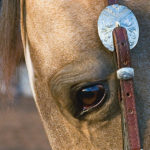 Credit: Thinkstock
Credit: ThinkstockMost of the time, vaccines are given to horses with no ill effect and no sign that the horse even received an injection. But on occasion, some horses demonstrate mild to moderate reactions to specific antigens (foreign proteins) or adjuvants (substance added to vaccines to enhance the immune response) within the vaccine. As an example, one common vaccine to cause reactions is one that targets equine herpesvirus (rhinopneumonitis).
What Might You See?
A horse with a vaccine reaction is often feeling “blue.” His posture may be deflated, his attitude and energy levels flat, his appetite low. He may have a fever. Muscles may be sore all over or just local to the injection site. The horse may move in a stilted manner, particularly if the neck muscles are affected. An adverse reaction in the neck may make it uncomfortable for the horse to reach for food and water that is low to the ground. If muscle soreness occurs with an injection in the hind end, then there may be associated lameness. Swelling sometimes occurs around an injection site, ranging from very slight to moderate, with the horse resentful if you attempt to press over that area.
What to Do About It
Often, such reactions are transient, usually resolving spontaneously within 48-96 hours. Many horses respond well to one or two treatments with a low dose of an NSAID like phenylbutazone or flunixin. NSAIDs usually provide immediate relief, within just a few hours. Even if managed with “benign neglect,” i.e., doing nothing, the adverse reaction will run its course and abate.
On a more serious note, on a rare occasion, a horse could have an anaphylactic reaction such as a person might experience who is allergic to bee stings, peanuts or shellfish. This is life threatening and requires immediate intervention. In 31 years of practice, I have never witnessed anything even remotely resembling an acute allergic response to any vaccine. Most equine vaccines are extremely safe, but there could be one individual horse that is extremely sensitive so it is prudent to always observe your horse for a problem following immunization.
If you know your horse is sensitive to a particular vaccine and has experienced an adverse reaction, then it helps to pre-medicate with an NSAID just before or at the time of vaccination. Usually, this prevents the adverse response entirely.





